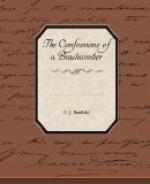The corrobboree of the Princess Charlotte Bay boys also owes its origin to Nature, but Nature in one of her most unpoetical moods—a mood as typical of Constantinople as of their native shores, for its motive is nothing more than an everyday dogfight.
Shall the uncultured blacks not have their own way when they seek entertainment, holding “as it were the mirror up to Nature,” and finding that it reflects the commonest of all themes? They among all the nations of the world alone have discovered what to them is music and the poetry of motion in an occurrence that has no geographical limitations, is not restricted by language, nor to be withered by age.
While the orchestra taps its boomerangs and claps its hands and grunts, two boys in mere nature progress towards the fire in a series of stiff, stilty jumps, the legs from the hips to the ankles being rigid; then the knees shake in a rapid succession of spasmodic jerks; the actors emit sounds resembling the preliminary growling and snarling of a couple of angry dogs. Action and utterance develop in speed and time as the fight begins in earnest, and the art of the performance consists in its duration—the powers of sustained effort, the accuracy of time maintained between the orchestra and the actors, and the fidelity to nature of the vocal effects. A singularly uncouth subject for an opera or even a ballet—the snarling, scuffling and snapping of quarrelsome dogs whose fury is working up to a climax, and it soon becomes as monotonous to unaccustomed ears as the masterpieces of some German composers to those whose musical education is below the required standard; but the boys will spend the best part of the long night in its unvarying repetition.
Once a variation did take place. “Yellowbelly” (pronounced decently “Yellowby”) danced first in the company of giggling “Peter;” and then fat “Charley” and big “Johnny,” shy “Mammeroo” and little deaf “Antony,” in turns, his body glistened with perspiration, and his eyes sparkled with the joy of a phenomenal accomplishment. All beholders were filled with wonder and gratification. It was Yellowby’s night out. The spirit of Terpsichore was upon him. His enthusiasm amounted to exultation. He was astonishing not only the silent and subdued natives of Dunk Island, but even his own familiar friends. Never had any seen such a classic interpretation of the theme, such brilliant leg movement, nor heard such realistic growling and snapping and intermittent yelps, such muffled, sob-like inspirations. Yellowby danced as dances the artist, so graphically interpreting the subject that the bewildered orchestra forgot itself. All were borne away in spirit to the scene of some far-off, familiar camp, where the scents of decayed fish and turtle-bones, and of a multitude of uncleanly dogs commingled with the bitter smoke of mangrove wood fires, where amid the yells of gins and the screeches of piccaninnies and the walloping of men, two mangy curs noisily wrestled.




